Plot
Nawuth Keat was the fifth of eight children in a Cambodian village known as Salatrave. His father was a prosperous rice farmer, owning both a motorcycle and a tractor. This wealth places Nawuth and his family in particular danger from the Khmer Rouge.
After the dictator Pol Pot overruns the government with the aid of the Khmer Rouge, Nawuth's life is completely transformed. Without warning, Salatrave is attacked and Nawuth's mother, grandmother, sister, aunt, and uncle are massacred. Nawuth himself is shot three times. Nawuth survives his attack and is sent by his father to live in the city of Battambang with his older sister, Chantha. Nawuth's father remains in Salatrave.
Eventually, the Khmer Rouge invade Battambang and Nawuth is forced to flee with his brothers (Hackly, Bunna, and Chanty), Chantha, and Chantha's fiancé (Van Lan). They return to the ruins of Salatrave, where Chantha and Van Lan are soon married.
Nawuth's father flees to the jungle to escape certain death, while Nawuth and the rest of the family are forced into labour by the Khmer Rouge. Food is scarce and they suffer from malnutrition. The family is further separated when Bunna is forced to join a chat, a team of teenagers forced to build dams and huts. Nawuth eventually escapes from the labour camp and joins his father in the jungle, where he stays for many months. While in the Jungle, Nawuth is forced to eat monkeys, turtles, snakes, and whatever other animals he can kill.
Nawuth later rejoins Van Lan, only to find nothing has changed for the better. There is less food and the murders have gotten worse. At this time Nawuth witnesses an old man's murder and realizes how truly evil the Khmer Rouge are. After some time back, food is too scarce to survive. During that year, more people died from starvation than from bullets. Then one morning, Van Lan left to visit his parents. During this time, Nawuth stole some rice from neighbouring farms. He also stole squash and made traps for fish.
Nawuth and his brothers suffer from starvation and their bellies become bloated. Due to this, he and his brother, Chanty, go back to the neighbouring farms to steal more rice, and they are caught. The Khmer Rouge let them go. Due to a lack of food, Nawuth gets infected. Most people have died from this infection, so Van Lan takes him to a doctor, and the doctor saves his life by giving Nawuth an enema. Afterwards, Nawuth is told to guard a large building filled with corn. Monkeys steal the corn, and Nawuth is yelled at by the soldier who assigned him the task. He survives and once again guards the corn. Using traps his father taught him how to make, he catches a few monkeys that try to steal the corn and eats them. Afterward, he takes some of the corn and hides in the jungle; and he is caught, but his life is spared. The weeks that followed were harsh: people blamed stolen food products on him, but the guards did not believe them. A while later, his father was killed.
Some time passed before the world gave any help. The Vietnamese started to attack the Khmer Rouge and a war started.
The Vietnamese began to attack the cities. Chantha gave birth to a baby named Vibol during this time. Nawuth is caught in the crossfire shortly after. It was a small skirmish, but many people were injured. They did not get away though: the Khmer Rouge made them march further inland, away from the Vietnamese-protected zones. A few weeks later, they left the Khmer Rouge area for the city. About thirty people left with them at night. They ate what they could. When they finally got to the cities, they met up with Van Lan's family. When there, Nawuth met a child named Ang. They became best friends. The Vietnamese were "an improvement" over the Khmer Rouge, but they were still ruthless. Along in the city, Nawuth got his palm read, and it turned out to be an accurate statement. During this time, Van Lan had a talk with Nawuth about leaving. The Vietnamese have taken what the Khmer Rouge have not destroyed. A few days later they say goodbye and leave. They walked more than they had ever. The Vietnamese did not want the world to know that they were not saviours, so they classified the wanderers as enemies. They had to drink from a pond with dead bodies in it, and the Khmer Rouge changed their names to Angka, or "The Organization of Saviors". Finally, they slipped across the border to sneak into a Thai refugee camp, where life was almost as bad: it was run by the United Nations. They got one chicken every two weeks and a bag of rice a month. Some of the Thai refugee camps would deport thousands of refugees back into Cambodia. The Cambodians shot the old and the weak, and the people in the front were killed by landmines. The United Nations got involved.
Chantha gave a woman one hundred dollars worth of gold, and Nawuth split up with his family and friends. The woman took him in, only to treat him like trash. The family that Nawuth is staying with has a sponsor in Paris, who is willing to pay for the airplane trip. Nawuth is supposed to meet Van Lan and the rest of his family in Paris. Nawuth and his "family" leave to go to another camp. There, they got a chicken a week, but Nawuth would steal religious offerings given to Buddhist monks anyway. A few weeks later, his "mom" tells him they aren't going to Paris after all: their sponsor had been unable to buy the tickets, but instead, there would be a chance they would be able to go to the United States. They had a sponsor in the United States, but they had to wait an entire year to go. When they were allowed to leave, they got medical examinations, but the doctor misread the bullet wound on Nawuth's arm as an infection and pronounced Nawuth to be sick. They had to stay. The family shunned Nawuth. Over the following months, the doctor was convinced that the scars on Nawuth were not infections, so he signed the papers for qualification. They were moved to another camp.
This camp was more crowded than the others. They spent two weeks there, and then they got sponsored and were told: "In two days, you leave for the United States". There, the bus that took him was larger than any bus he had ever seen, and the actual airport was the same, the largest building he had ever seen. They landed in San Francisco, and after nine years of suffering, Nawuth was free.
Afterword
Shortly after, Nawuth left for Portland, Oregon. This is where he would split up with the family. This was because he was forced to work, while the other kids got to play. He got a job, being paid $3.17 an hour, and a monthly welfare check of $300, which he gave to his "mom". When he found out that Van Lan, Chantha, Vibol, and Bunna lived in a refugee camp in Indonesia, he asked "mom" for ten dollars. She refused. He left to go and live with his great aunt who lived not too far away from Portland. He later married his high school sweetheart, Rany Prak, who was also a Cambodian immigrant. They had three children: Brian, Anthony, and Stephanie. Van Lan, Chantha, Vibol, and Bunna all live in Lyons, France. Ang also made it to France. Hackly lives with Nawuth, and Nawuth's oldest sister Chanya, and works in a military hospital in Pursat.
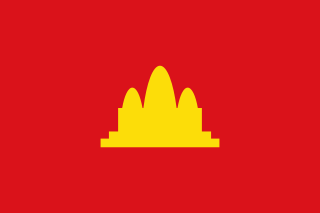
The Khmer Rouge is the name that was popularly given to members of the Communist Party of Kampuchea (CPK) and by extension to the regime through which the CPK ruled Cambodia between 1974 and 1979. The name was coined in the 1960s by then Chief of State Norodom Sihanouk to describe his country's heterogeneous, communist-led dissidents, with whom he allied after his 1970 overthrow.

Pol Pot was a Cambodian revolutionary, dictator, and politician who ruled Cambodia as Prime Minister of Democratic Kampuchea between 1976 and 1979. Ideologically a communist and a Khmer ethnonationalist, he was a leading member of Cambodia's communist movement, the Khmer Rouge, from 1963 to 1997 and served as General Secretary of the Communist Party of Kampuchea from 1963 to 1981. His administration converted Cambodia into a one-party communist state and perpetrated the Cambodian genocide.

The Cambodian Civil War was a civil war in Cambodia fought between the forces of the Communist Party of Kampuchea against the government forces of the Kingdom of Cambodia and, after October 1970, the Khmer Republic, which had succeeded the kingdom.

The Killing Fields is a 1984 British biographical drama film about the Khmer Rouge regime in Cambodia, which is based on the experiences of two journalists: Cambodian Dith Pran and American Sydney Schanberg. It was directed by Roland Joffé and produced by David Puttnam for his company Goldcrest Films. Sam Waterston stars as Schanberg, Haing S. Ngor as Pran, and John Malkovich as Al Rockoff. The adaptation for the screen was written by Bruce Robinson; the musical score was written by Mike Oldfield and orchestrated by David Bedford.
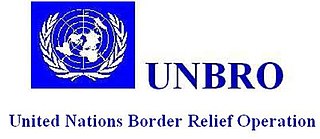
The United Nations Border Relief Operation (UNBRO) was a donor-nation funded relief effort for Cambodian refugees and others affected by years of warfare along the Thai-Cambodian border. It functioned from 1982 until 2001.

The Cambodian–Vietnamese War, known in Vietnam as the Counter-offensive on the Southwestern border, and by Cambodian nationalists as the Vietnamese invasion of Cambodia, was an armed conflict between Democratic Kampuchea, controlled by Pol Pot's Khmer Rouge, and the Socialist Republic of Vietnam. The war began with repeated attacks by the Liberation Army of Kampuchea on the southwestern border of Vietnam, particularly the Ba Chúc massacre which resulted in the deaths of over 3,000 Vietnamese civilians. On 23 December 1978, 10 out of 19 divisions of Khmer Rouge's military divisions opened fire along the shared Southwestern borderline with Vietnam with the goal of invading the Vietnamese provinces of Đồng Tháp, An Giang and Kiên Giang. On 25 December 1978, Vietnam launched a full-scale invasion of Kampuchea, and subsequently occupied the country and removed the government of the Communist Party of Kampuchea from power.
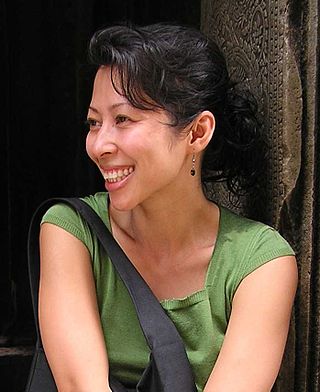
Loung Ung is a Cambodian American human-rights activist, lecturer and national spokesperson for the Campaign for a Landmine-Free World, between 1997 and 2003. She has served in the same capacity for the International Campaign to Ban Landmines, which is affiliated with the Vietnam Veterans of America Foundation.

Kampuchea, officially known as Democratic Kampuchea from 5 January 1976 onward, was a one-party totalitarian state which encompassed modern-day Cambodia and existed from 1975 to 1979. It was controlled by the Khmer Rouge (KR), the name popularly given to the followers of the Communist Party of Kampuchea (CPK), and was founded when KR forces defeated the Khmer Republic of Lon Nol in 1975.

The People's Republic of Kampuchea (PRK) was a partially recognised client state in Southeast Asia supported by Vietnam which existed from 1979 to 1989. It was founded in Cambodia by the Kampuchean United Front for National Salvation, a group of Cambodian communists who were dissatisfied with the Khmer Rouge due to its oppressive rule of Cambodia and defected from it after the overthrow of Democratic Kampuchea, Pol Pot's government. Brought about by an invasion from Vietnam, which routed the Khmer Rouge armies, it had Vietnam and the Soviet Union as its main allies.
After the 1978 Vietnamese invasion of Cambodia and subsequent collapse of Democratic Kampuchea in 1979, the Khmer Rouge fled to the border regions of Thailand, and, with assistance from China, Pol Pot's troops managed to regroup and reorganize in forested and mountainous zones on the Thai-Cambodian border. During the 1980s and early 1990s Khmer Rouge forces operated from inside refugee camps in Thailand, in an attempt to de-stabilize the pro-Hanoi People's Republic of Kampuchea's government, which Thailand refused to recognise. Thailand and Vietnam faced off across the Thai-Cambodian border with frequent Vietnamese incursions and shellings into Thai territory throughout the 1980s in pursuit of Cambodian guerrillas who kept attacking Vietnamese occupation forces.

Cambodia was a farming area in the first and second millennia BC. States in the area engaged in trade in the Indian Ocean and exported rice surpluses. Complex irrigation systems were built in the 9th century. The French colonial period left the large feudal landholdings intact. Roads and a railway were built, and rubber, rice and corn grown. After independence Sihanouk pursued a policy of economic independence, securing aid and investment from a number of countries.
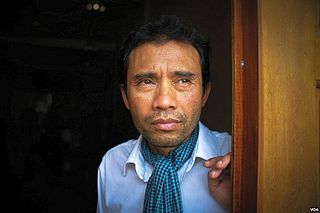
Arn Chorn-Pond is a Cambodian musician, human rights activist, and a survivor of the Khmer Rouge regime. He is an advocate for the healing and transformative power of the arts, and especially music.
Sa Kaeo Refugee Camp was the first organized refugee relief camp established on the Thai-Cambodian border. It was built by the Royal Thai Government with support from international relief agencies including the United Nations. It opened in October 1979 and closed in early-July 1980. At its peak the population exceeded 30,000 refugees; no formal census was ever conducted.

Nong Samet Refugee Camp, in Nong Samet Village, Khok Sung District, Sa Kaeo Province, Thailand, was a refugee camp on the Thai-Cambodian border and served as a power base for the Khmer People's National Liberation Front (KPNLF) until its destruction by the Vietnamese military in late 1984.

Nong Chan Refugee Camp, in Nong Chan Village, Khok Sung District, Sa Kaeo Province, Thailand, was one of the earliest organized refugee camps on the Thai-Cambodian border, where thousands of Khmer refugees sought food and health care after fleeing the Cambodian-Vietnamese War. It was destroyed by the Vietnamese military in late 1984, after which its population was transferred to Site Two Refugee Camp.
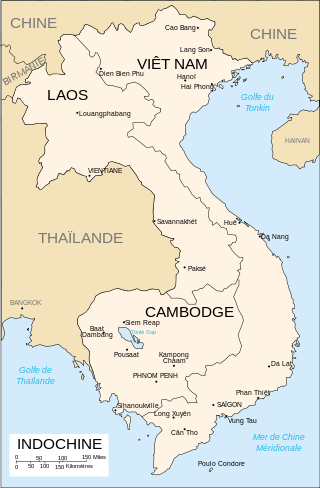
The Indochina refugee crisis was the large outflow of people from the former French colonies of Indochina, comprising the countries of Vietnam, Cambodia, and Laos, after communist governments were established in 1975. Over the next 25 years and out of a total Indochinese population in 1975 of 56 million, more than 3 million people would undertake the dangerous journey to become refugees in other countries of Southeast Asia, Hong Kong, or China. According to the United Nations High Commissioner for Refugees, 250,000 Vietnamese refugees had perished at sea by July 1986. More than 2.5 million Indochinese were resettled, mostly in North America, Australia, and Europe. More than 525,000 were repatriated, either voluntarily or involuntarily, mainly from Cambodia.

Cambodian genocide denial is the belief expressed by some Western academics that early claims of atrocities committed by the Khmer Rouge government (1975–1979) in Cambodia were much exaggerated. Many scholars of Cambodia and intellectuals opposed to the U.S. involvement in the Vietnam War denied or minimized reports of human rights abuses of the Khmer Rouge, characterizing contrary reports as "tales told by refugees" and U.S. propaganda. They viewed the assumption of power by the Communist Party of Kampuchea as a positive development for the people of Cambodia who had been severely impacted by the Vietnam War and the Cambodian Civil War. On the other side of the argument, anti-communists in the United States and elsewhere saw in the rule of the Khmer Rouge vindication of their belief that the victory of Communist governments in Southeast Asia would lead to a "bloodbath."
The Cambodian humanitarian crisis from 1969 to 1993 consisted of a series of related events which resulted in the death, displacement, or resettlement abroad of millions of Cambodians.

First They Killed My Father is a 2017 Cambodian–American Khmer-language biographical historical thriller film directed by Angelina Jolie and written by Jolie and Loung Ung, based on Ung's memoir of the same name. Set in 1975, the film depicts 5-year-old Loung, who is forced to be trained as a child soldier while her siblings are sent to labor camps during the Khmer Rouge regime.

The Dangrek genocide also known as "the Preah Vihear pushback" is a border incident which took place along the Dangrek Mountain Range on the Thai-Cambodian border which resulted in the death of many mostly Sino-Khmer refugees who were refused asylum by the Kingdom of Thailand in June 1979.















